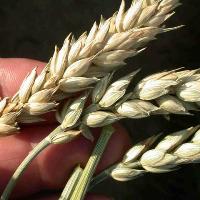Canada: Potential fusarium head blight infection

Swine producers in Manitoba and Saskatchewan, Canada, are being advised to test wheat intended for swine feed for deoxynivalenon, or DON, the mycotoxin that is produced by fusarium head blight.
Climatic conditions throughout Manitoba this year were ideal for the development of disease resulting in widespread infection of the province’s hard red spring wheat crop.
Wetter climate
“If you look at the distribution of fusarium head blight and who’s likely to have conditions that are most conducive to fusarium, we definitely see southern Manitoba and south-eastern Saskatchewan as the main areas, largely because we seem to be in a wetter climate so we have more humidity and we also tend to be warmer,†Dr. Anita Brûlé-Babel, a plant geneticist and wheat breeder with the University of Manitoba’s department of plant science explains.
“The species that can not tolerate very high levels of deoxynivalenon or fusarium are pigs,†says Manitoba Agriculture Food and Rural Initiatives (MAFRI) farm production extension specialist-swine Ron Bazylo based in Dauphin.
“It’s been shown that levels above one part per million in a complete feed will result in some feed refusal. If you have levels anywhere from one to two parts per million you’ll get feed refusal of up to five percent and at levels such as four parts per million you can get feed refusal of up to 25 percent.â€
Feed testing
Bazylo notes he is aware of one producer who was feeding levels just above five parts per million and the pigs stopped eating completely. Although the mycotoxin doesn’t appear to have a strong reproductive effect he recommends against feeding contaminated grain to dry or lactating sows. Bazylo encourages swine producers, if they’re purchasing grain, to make sure it comes from a producer that has tested it for fusarium.
Click here for the free Pig Progress newsletter
Wetter climate
“If you look at the distribution of fusarium head blight and who’s likely to have conditions that are most conducive to fusarium, we definitely see southern Manitoba and south-eastern Saskatchewan as the main areas, largely because we seem to be in a wetter climate so we have more humidity and we also tend to be warmer,†Dr. Anita Brûlé-Babel, a plant geneticist and wheat breeder with the University of Manitoba’s department of plant science explains.
“The species that can not tolerate very high levels of deoxynivalenon or fusarium are pigs,†says Manitoba Agriculture Food and Rural Initiatives (MAFRI) farm production extension specialist-swine Ron Bazylo based in Dauphin.
“It’s been shown that levels above one part per million in a complete feed will result in some feed refusal. If you have levels anywhere from one to two parts per million you’ll get feed refusal of up to five percent and at levels such as four parts per million you can get feed refusal of up to 25 percent.â€
Feed testing
Bazylo notes he is aware of one producer who was feeding levels just above five parts per million and the pigs stopped eating completely. Although the mycotoxin doesn’t appear to have a strong reproductive effect he recommends against feeding contaminated grain to dry or lactating sows. Bazylo encourages swine producers, if they’re purchasing grain, to make sure it comes from a producer that has tested it for fusarium.
Click here for the free Pig Progress newsletter











